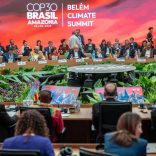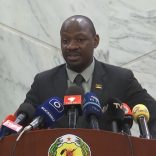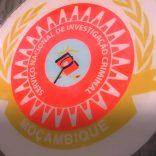Mozambique: District committees for FIDEL evaluation sworn in
Mozambique may face period of low growth and high prices – Standard Bank

An analysis by Standard Bank Mozambique warned last Thursday that the country may face a period of low economic growth and high inflation, making the government’s options regarding economic policy more difficult.
“Rising inflation, when employment is cyclically low due to the weak economy, poses a challenge for policy makers, because policies to combat inflation may slow down economic growth, increasing unemployment,” reads an analysis of the Mozambican economy cited by Lusa.
In the report, Standard Bank’s economic studies office stresses that “there should be a recovery in the second half [of this year], but it is quite possible that Mozambique faces the spectre of ‘stagflation'”, that is, by low or even zero economic growth, accompanied by a sharp rise in prices.
Inflation in Maputo, Beira and Nampula accelerated, in year-on-year terms, to 5.1% in February, compared to the 4.1% recorded in January, “exceeding the forecast of 4.5% and raising the spectre of stagflation”, reads the text, which points out that the price rise was mainly motivated by the increase in food prices, which rose 11.5%, and electricity costs, which increased 11.7%.
It is necessary to go back to December 2017 to find a higher annual inflation figure (variation in consumer prices in relation to the same month of the previous year), which was then 5.65%, according to the National Statistics Institute (INE).
For the country as a whole, growth was at 1.34% in February, which represents a slight acceleration compared to the 1.18% increase registered in the previous month.
In its analysis of macroeconomic and public finance indicators, Standard Bank also points out that, “last year, the growth in the amount of domestic public debt was 27.2% compared to 2019, which represents 20.2% of GDP, excluding the debt of public companies, and may raise concerns about debt sustainability”.
At this point, analysts warn that “according to the most recent Debt Sustainability Analysis carried out by the International Monetary Fund, Mozambique’s sovereign debt was only considered sustainable from a future perspective, that is, when future gas revenues are considered and loans from Mozambique Asset Management (MAM) and ProIndicus are excluded”.
In the text, the Standard Bank economics department further points out that “a relaxation of restrictions on movement, progress on demilitarisation in central Mozambique and progress in combating terrorism in Cabo Delgado may improve the 2021 economic outlook , especially if they are supported by more accelerated progress on the country’s gas projects”.












Leave a Reply
Be the First to Comment!
You must be logged in to post a comment.
You must be logged in to post a comment.